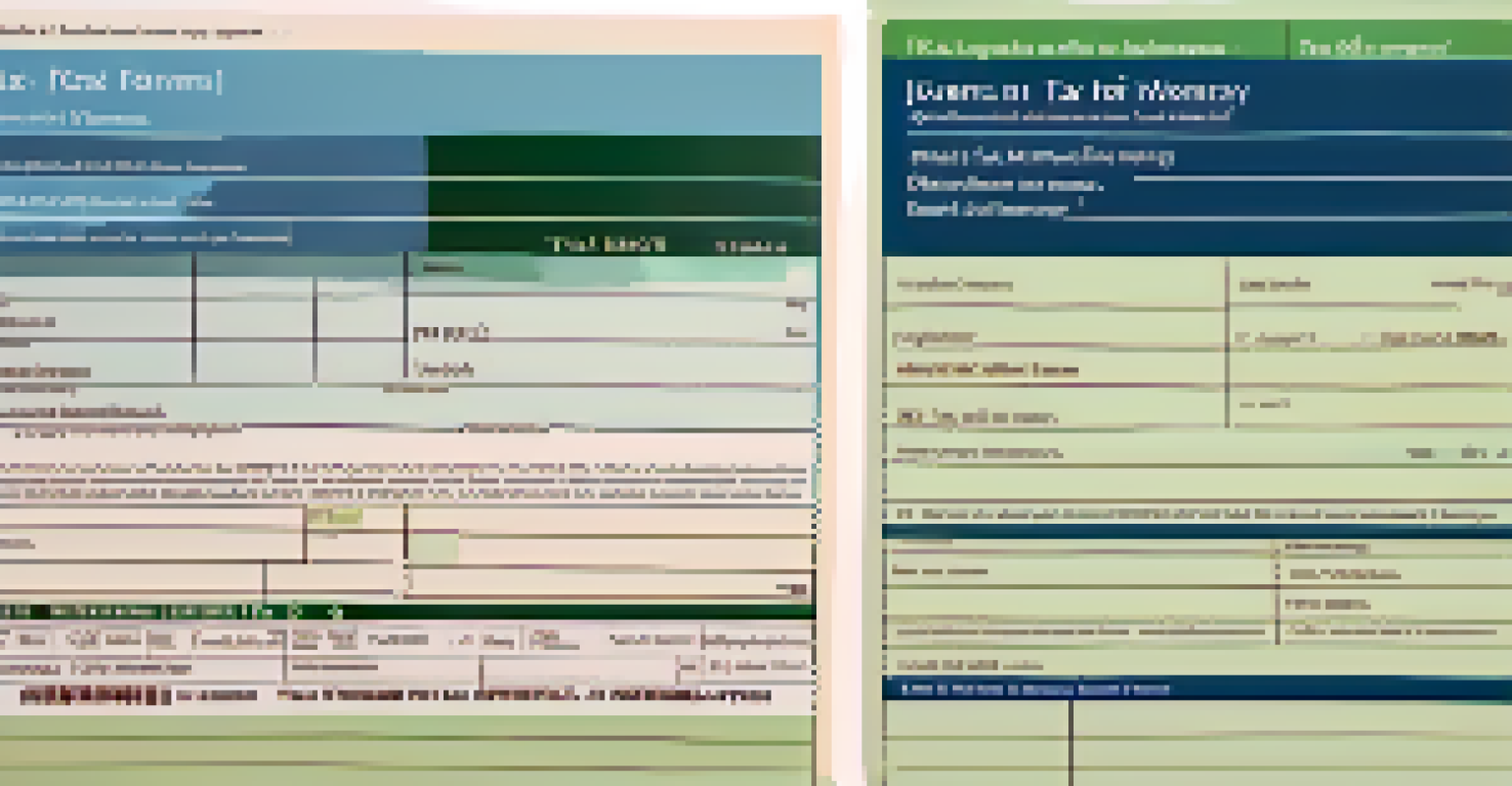Tax Implications of Co-Ownership in Real Estate Investments

What is Co-Ownership in Real Estate Investments?
Co-ownership in real estate refers to a situation where two or more individuals share ownership of a property. This can take various forms, such as joint tenancy, tenancy in common, or community property. Each type of co-ownership has its own legal implications and rights concerning the property, which can impact how taxes are handled.
Real estate is not just about the property; it's about the partnerships and relationships that come with it.
In joint tenancy, all owners have equal shares and rights, meaning if one owner passes away, their share automatically transfers to the remaining owners. On the other hand, tenancy in common allows for unequal shares, and each owner's share can be sold or inherited independently. Understanding these distinctions is crucial for managing tax responsibilities effectively.
Ultimately, co-ownership can be an excellent way to pool resources for a real estate investment, but it’s essential to comprehend the legal structures that govern these arrangements to avoid potential tax pitfalls.
Tax Responsibilities of Co-Owners
Co-owners of real estate are generally responsible for reporting their share of income and expenses on their personal tax returns. Income generated from the property, such as rent, must be divided according to the ownership agreement and reported accordingly. This means that each co-owner must keep accurate records of their share of income and expenses to ensure compliance with tax regulations.

Additionally, co-owners should be aware of deductions available to them, such as mortgage interest, property taxes, and depreciation. These deductions can significantly reduce taxable income, but they must be claimed in proportion to each owner's share. It's important to communicate openly with co-owners about these financial aspects to avoid confusion or disputes during tax season.
Types of Co-Ownership Explained
Co-ownership in real estate can take various forms, such as joint tenancy and tenancy in common, each with unique legal implications.
Failing to comply with tax reporting responsibilities can lead to penalties or audits, so understanding your obligations as a co-owner is essential. Consulting with a tax professional can provide clarity on how to navigate these responsibilities.
Understanding Capital Gains Tax for Co-Owners
When a co-owned property is sold, capital gains tax may be applicable on the profit made from the sale. Each co-owner is responsible for reporting their share of the gain, which is calculated based on the selling price minus the property's adjusted basis (original purchase price plus improvements). This tax can vary significantly depending on how long the property was held and other factors.
In the world of investing, nothing is as important as understanding your tax obligations.
For instance, if a property has been held for over a year, it may qualify for long-term capital gains tax rates, which are generally lower than short-term rates. This distinction can significantly impact the overall tax bill, so it's beneficial for co-owners to consider the timing of a sale. Planning ahead can help minimize tax liability.
It's also worth noting that certain exemptions may apply, such as the primary residence exclusion, which can allow homeowners to exclude a portion of their capital gains from taxation under specific conditions. Understanding these nuances can help co-owners make informed decisions regarding the timing and method of property sales.
Deductions and Benefits for Co-Owners
Co-owners can take advantage of various tax deductions that can lower their overall tax burden. Common deductions include mortgage interest, property management fees, and repairs or improvements made to the property. Each owner can claim these deductions based on their ownership share, making it essential to maintain accurate records of expenses.
Additionally, depreciation is a valuable deduction that co-owners can utilize. This allows property owners to deduct a portion of the property’s value over time, reflecting wear and tear. Since real estate is often a long-term investment, depreciation can significantly reduce taxable income.
Tax Responsibilities for Co-Owners
Co-owners must accurately report their share of income and expenses on personal tax returns to comply with tax regulations.
Maximizing these deductions requires clear communication and agreement among co-owners about which expenses to claim. Keeping organized records and considering the tax implications of any decisions made regarding the property can lead to more favorable financial outcomes.
Estate Planning Considerations for Co-Owners
Co-ownership can complicate estate planning, especially if one owner passes away. In joint tenancy arrangements, the deceased owner’s interest automatically transfers to the surviving owners, which can affect inheritance and tax implications. It's crucial for co-owners to have a clear estate plan that outlines what happens to their share of the property.
For those in a tenancy in common arrangement, each owner’s share can be inherited or sold independently, which means estate planning becomes even more critical. If one owner passes away without a will, their share may be distributed according to state laws, potentially creating disputes among heirs or co-owners.
Engaging in proactive estate planning discussions can help co-owners avoid future complications. Consulting with an estate attorney can provide guidance on how to structure ownership and prepare for potential tax implications.
Impact of Local Tax Laws on Co-Ownership
Local tax laws can significantly influence how co-ownership is treated concerning property taxes and income taxes. Different states have varying regulations regarding property taxes, which can affect how much each co-owner must pay. Understanding these local laws is essential to avoid unexpected financial burdens.
For instance, some states offer tax breaks or exemptions for certain types of property ownership, such as primary residences or properties used for specific purposes. Co-owners should research local tax laws to determine what benefits they might qualify for based on their ownership structure.
Importance of Professional Guidance
Consulting with tax professionals and real estate attorneys can help co-owners navigate complex tax implications and establish clear ownership agreements.
Being aware of local tax regulations can also help co-owners make strategic decisions about property management, investment, and potential sales. This knowledge empowers co-owners to navigate their tax responsibilities more efficiently, ultimately leading to better investment outcomes.
Consulting Professionals for Co-Ownership Tax Issues
Given the complexities of tax implications associated with co-ownership in real estate, seeking professional advice is often a wise decision. Tax professionals can provide tailored advice based on the specific ownership structure and local tax laws, helping co-owners navigate their responsibilities effectively. This can save time and stress, especially during tax season.
Additionally, real estate attorneys can help co-owners draft agreements that outline ownership shares, responsibilities, and what happens in various scenarios, such as the sale of the property or the death of an owner. These agreements can provide clarity and prevent misunderstandings, ensuring that all parties are on the same page.

Investing in professional guidance not only clarifies tax implications but also promotes a healthier co-ownership relationship. With the right support, co-owners can focus on their investment and enjoy the benefits of their partnership.